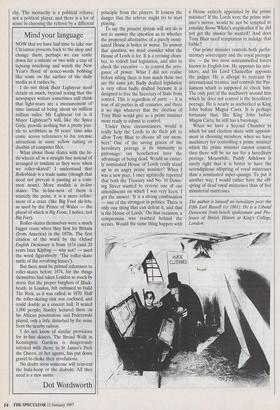Mind your language
NOW that we have had time to take our Christmas presents back to the shop and change them, perhaps we can settle down for a minute or two with a cup of lapsang souchong and watch the New Year's flood of nonce-words bobbing like scum on the surface of the daily media as it rushes by.
I do not think Buzz Lightyear need detain us much, beyond noting that the newspaper writers sometimes still think that light-years are a measurement of time instead of being about six million million miles. Mr Lightyear (or is it Major Lightyear?) will, like the Spice Girls, provide nothing but a pretty puz- zle to scribblers in 50 years' time who come across references to his totemic attractions in some yellow cutting or dustbin of computer files.
What about those skates with the lit- tle wheels all in a straight line instead of arranged in tandem as they were when we roller-skated? I understand that Rollerblade is a trade name (though that need not prevent it passing as a com- mon noun). More modish is in-line skates. The in-line-ness of them is scarcely the point, it is a mere refine- ment of a craze (like Big Foot ski-lets, as used by the Prince of Wales — the plural of which is Big Foots, I notice, not Big Feet).
Roller-skates themselves were a much bigger craze when they first hit Britain (from America) in the 1870s. The first citation of the word by the Oxford English Dictionary is from 1874 (and 20 years later Kipling — why not? — used the word figuratively: The roller-skate rattle of the revolving lenses').
But there must be printed references to roller-skates before 1874, for the things themselves had taken London so much by storm that the proper burghers of Black- heath, in London, felt enthused to build The Rink, as it was called, in 1870. Half the roller-skating rink was enclosed, and could double as a concert hall. It seated 1,000 people; Stanley lectured there on his African penetrations and Paderewski played, only a little disturbed by the noise from the nearby railway.
I do not know of similar provisions for in-line skaters. The Broad Walk in Kensington Gardens is dangerously infested with them; in St James's Park the Queen, or her agents, has put down gravel to choke their revolutions.
No doubt soon someone will reinvent the hula-hoop or the diabolo. All they need is a new name.
Dot Wordsworth































 Previous page
Previous page